The UN climate summit COP26 was held in Glasgow from 31 October–12 November 2021, hosted by the UK Government.
COP26 was the 26th meeting of all nations of the world (‘conference of the parties’) to discuss the actions necessary to tackle the climate emergency. Delegates came together to discuss the legally-binding commitments they made in the 2015 Paris Agreement.
Alongside the negotiations, admitted observers shared their expertise and experience to contribute ideas and influence the discussions, through various side events and panel discussions.
We used COP26 as a key opportunity to work towards, a moment to build and diversify the climate movement in Scotland, and as a lever to deliver on our policy aims.
Civil society, activists and campaigners from around the world came to Glasgow in November 2021. We did everything that we could to give a warm welcome and offer practical support. For more information about our work during COP26 see below, and our COP26 Project summary on the Climate Fringe website.
Some highlights from COP26
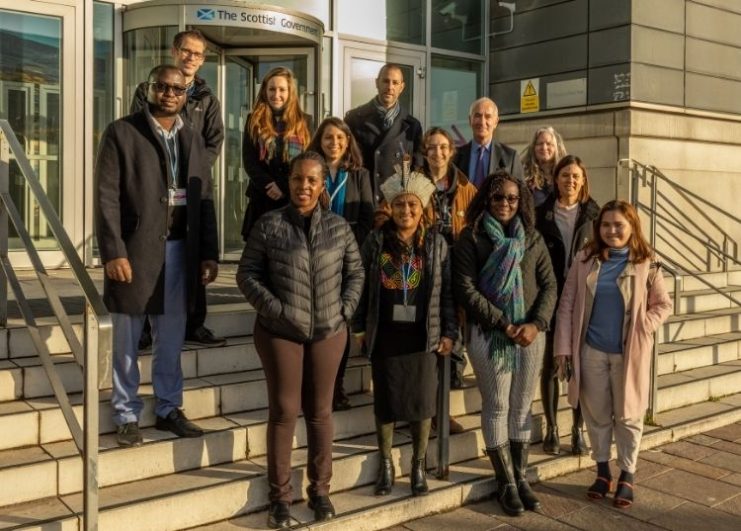
On Wednesday 9 November, we hosted a roundtable with the First Minister and a selection of COP26 delegates from the Global South, who had travelled to Glasgow with coalition members Oxfam Scotland, Christian Aid Scotland, Tearfund Scotland and SCIAF.
While praising her leadership, the delegates also urged her to deepen it in the last few days of COP26, by demanding that other rich countries stump up cash to support developing countries, slashing Scotland’s emissions and opposing all new fossil fuel projects.
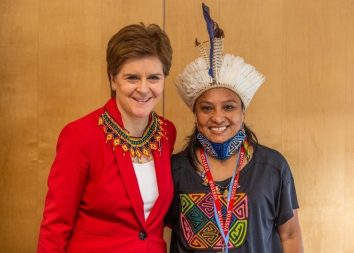
Jocabed Solano, an indigenous rights and climate change activist from Panama, who travelled to Glasgow with SCCS member Tearfund Scotland, presented a necklace to the First Minister, Nicola Sturgeon.
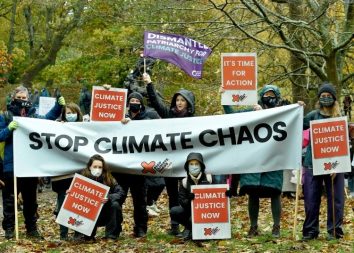
On Saturday 6 November, undeterred by wind and rain, SCCS members and staff joined tens of thousands of people marching on the streets of Glasgow for the Global Day of Action.
It was amazing to see such huge numbers of people, both in Glasgow and around the world, coming together for climate justice.
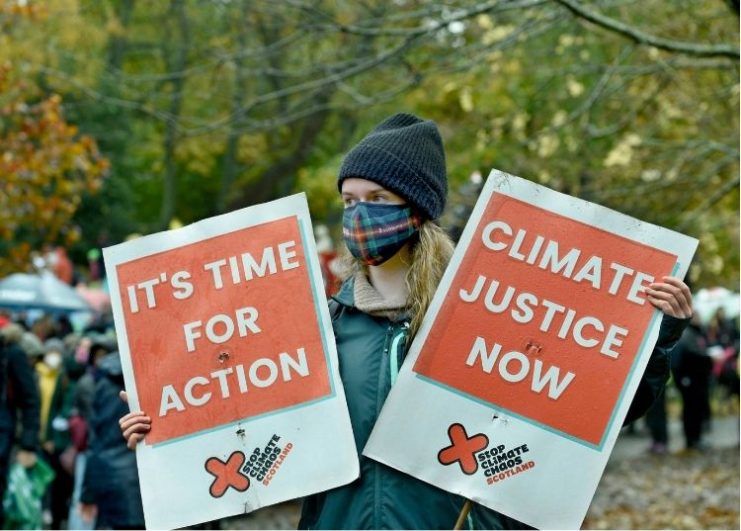
On Saturday 6 November, undeterred by wind and rain, SCCS members and staff joined tens of thousands of people marching on the streets of Glasgow for the Global Day of Action.
It was amazing to see such huge numbers of people, both in Glasgow and around the world, coming together for climate justice.
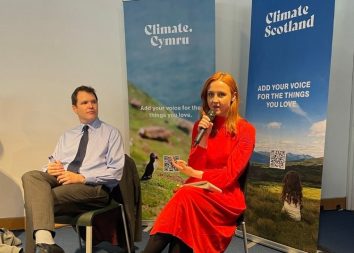
Tuesday 9 November saw a joint event between Climate Scotland and Climate Cymru take place in Scotland’s Climate Ambition Zone at The Lighthouse, Glasgow.
Speakers at the event included politicians Lee Waters, Deputy Minister for Climate Change in the Senedd, and Màiri McAllan MSP, Minister for Environment, Biodiversity and Land Reform.
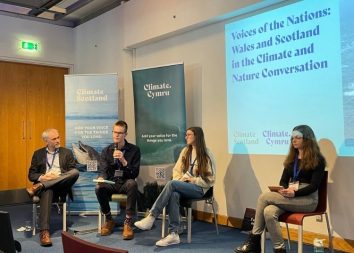
Climate Scotland’s youth ambassadors Rob Knott and Mollie Reid did themselves and the young people of Scotland proud, in voicing the concerns of young people across the nation.
Our policy asks for COP26
Our key demands centred around achieving faster and deeper emission reductions and increasing support for communities impacted by climate change.
We called on the Scottish Government to:
- Rapidly cut emissions to at least meet legal targets
- Increase its Climate Justice Fund by taxing high emitters.
We called on the UK Government to:
- Get on track for net-zero ASAP
- Lead a global scale up of financial support.
We called on the governments of all rich polluting countries to:
- Issue 1.5C aligned Nationally Determined Contributions and Long Term Strategies
- Meet the $100bn climate finance target and strengthen it.
Read our policy paper
Our key activities for COP26
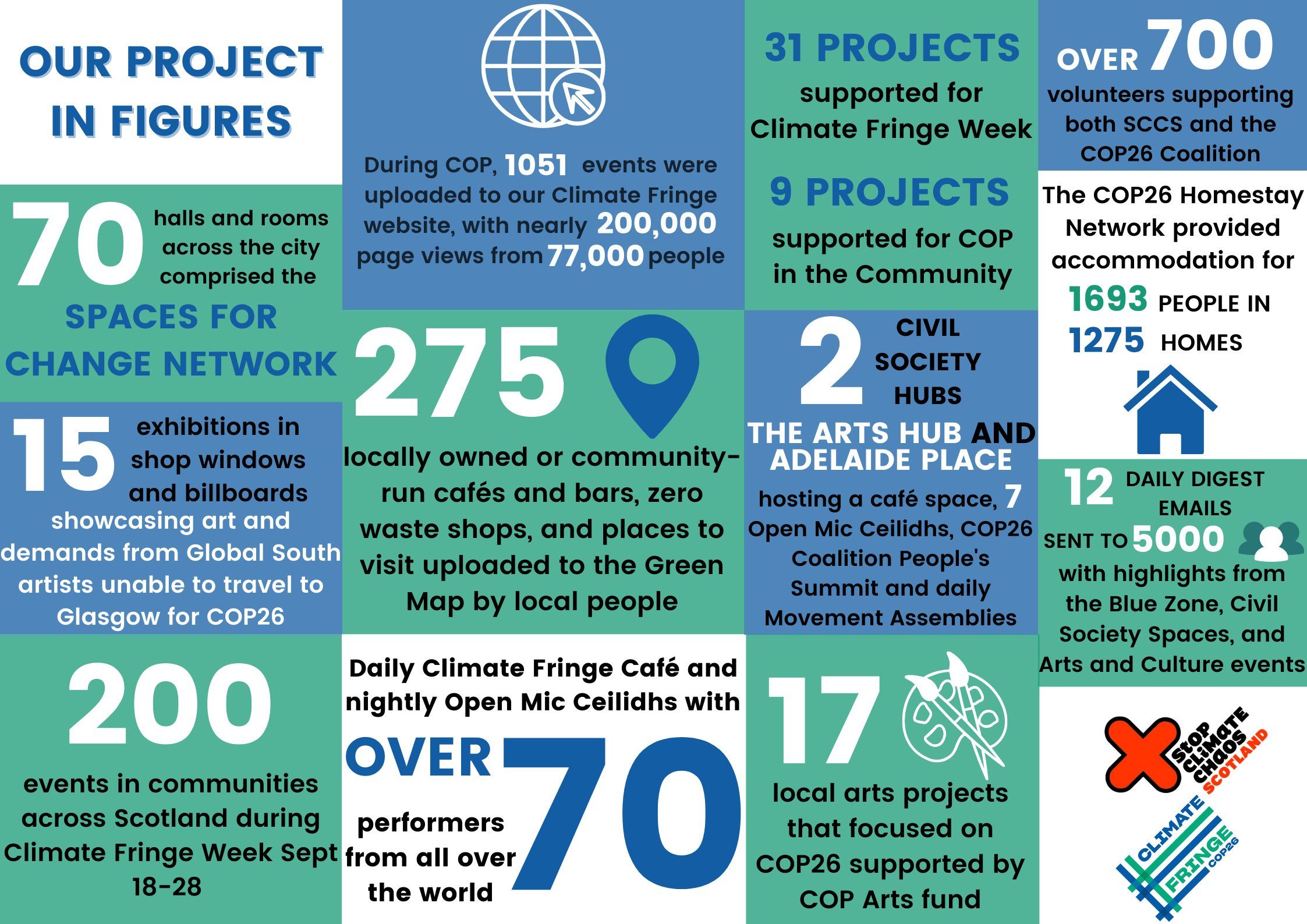
Climate Fringe
We created a dedicated website, climatefringe.org, to share information about events and activities in the run-up to and during COP26.
This includes:
- A calendar of climate-related events
- Venues – offer up or book a venue during COP
- Glasgow Green Map – to help visitors find sustainable and locally-run cafes, shops and community locations.
Visit climatefringe.org
COP26 Homestay Network
To offer affordable accommodation during the time of COP26, we collaborated with the COP26 Coalition and Human Hotel to create a platform, the COP26 Homestay Network.
The network hosted over 1,600 people from across the world who were visiting Glasgow for COP26. It enabled local hosts from across the central belt of Scotland to give a warm welcome to visiting climate change campaigners, scientists, and non-governmental organisations.
Find out more
Glasgow Climate Dialogues
The Glasgow Climate Dialogues were four online sessions, from 6-9 September 2021, designed to engage with, learn from and platform key Global South stakeholders on climate change ahead of COP26.
Each session was co-hosted by the Scottish Government and Scottish civil society and focused on a specific theme:
A communiqué summarises the outputs of these Dialogues, and intended to provide valuable inputs to COP26 negotiations on each of the four areas.
Read the communiqué
COP26 Frequently Asked Questions
COP is shorthand for ‘Conference of the Parties’. The term COP refers to the supreme decision-making body of the United Nations Framework Convention on Climate Change (UNFCCC), as well as to the global talks on climate change matters. At these talks, governments negotiate rules for addressing and tracking their progress on climate change. There are also platforms outside the negotiations for others to share information, build capacity and discuss policy solutions to climate change.
COP takes place typically every year over two weeks. The 2020 event ‒ delayed to 2021 ‒ will be the 26th climate meeting, which is why it is called COP26.
The location and presidency of COP tends to change for each meeting. The UK Government successfully bid to host the COP26 talks in Glasgow and has appointed Alok Sharma as President. The role of the ‘COP Presidency’ is to be a neutral overseer of the agenda and tone for COP, and to deliver outcomes.
Amelia Guy-Meakin, WWF Scotland
The UNFCCC (also called ‘the Convention’) was created in 1992 at the Earth Summit in Rio de Janeiro, and entered into force in March 1994.
The Convention is the foundation framework for governments to tackle climate change, with the ultimate objective to stabilise greenhouse gases “at a level that would prevent dangerous anthropogenic (human induced) interference with the climate system”. Almost all countries in the world have ratified, or have agreed to be ‘Parties’ to, the Convention.
Importantly, the UNFCCC is also the name of the Secretariat which supports the global response to climate change. Among other things, the Secretariat makes practical arrangements and prepares official documents for climate talks, provides expertise, assists Parties in implementing their climate commitments, and coordinates with other relevant international bodies. The UNFCCC Secretariat is based in Bonn, Germany and is headed by an Executive Secretary, Patricia Espinosa.
Amelia Guy-Meakin, WWF Scotland
The official UNFCCC COP is split into a Blue Zone, for official badge-holders only, and a Green Zone, which is open to the public to visit. The Green Zone is set to be in the Glasgow Science Centre, where the public will be able to interact with various organisations ‒ from businesses and universities, to NGOs and international organisations.
Meanwhile, within the Blue Zone ‒ across the River Clyde at the Scottish Event Campus (SEC) ‒ there will be UN officials, representatives from governments, negotiators, advisors, a lot of press and media, and organisations with ‘Observer’ status. The observer organisations are grouped into ‘constituencies’ including indigenous groups, women and gender, local government, business and industry, young people, trade unions, environmental NGOs and research NGOs. In the second week, heads of state will arrive and we expect 196 to be present at COP26.
In addition to the official COP spaces, there will be a Civil Society hub that will act as a base for activists from around the world to meet and socialise. The Civil Society hub will be open to everyone: those ‘badged’ delegates of COP from global civil society, and activists ‒ both local and those who will travel to Glasgow to add their voices to calls for global action.
Kat Jones, Stop Climate Chaos Scotland
Joining a local or international climate change group can be a great way to support campaigns focussing on issues on the table at COP26 ‒ wherever you are in the world for the actual event.
The build-up to COP is a great opportunity for raising awareness and getting new people involved in the climate conversation. To find out more about the myriad of projects, training, events, and other activities planned, visit our Climate Fringe website.
Organising community events and talking to your friends and family about climate change helps to build the movement from the ground up, bringing a diverse range of voices into the conversation. We encourage you to do this during Climate Fringe Week (18-26 September 2021).
During COP26 there will be a range of opportunities to get involved: from joining the people’s summit and mass mobilisations, to volunteering from home and across the city.
In what will no doubt be a cold Scottish winter, the people of Glasgow can help to provide a warm welcome to people coming from all over the world. Whether this is through providing a home for global activists through the COP26 Homestay Network, welcoming them into our communities, chatting about their experiences over coffee or just showing someone the way to the train station, together we can ensure that people feel at home in Glasgow.
Nick Cullen, Stop Climate Chaos Scotland
COPs are exciting, inspiring, infuriating and often baffling. Blocking countries work together to stop progress, progressive countries try to move things forward, civil society keeps the pressure up on the key issues. There are powerful speeches from Prime Ministers whose countries are disappearing beneath the rising seas and empty words from countries who just want to keep on the fossil gravy train.
The biggest failure was in 2009 in Copenhagen when expectations were very high that there would be a new binding, global deal done to tackle climate change. World leaders turned up in the second week of the conference to find that nothing useful had been agreed in the first week. At one point, Barack Obama and other world leaders were huddled in a room sitting around Russia’s President Medvedev as he typed out the weak Copenhagen Accord on his laptop.
Probably the biggest success was in 2015 when the Paris Agreement was negotiated, committing countries to keep the global temperature rise well below 2°C and make efforts towards keeping it below 1.5°C. Despite many weaknesses the Paris Agreement has been a surprisingly effective spur to both governments and business.
Richard Dixon, Friends of the Earth Scotland
COPs are large political events with thousands of stakeholders from across the world. The atmosphere can often seem festive, but the instance of a COP is infused with purpose. The people who participate in the negotiations and the groups that organise outside of them are determined to see outcomes that will reduce the human-made threat to the climate and biodiversity and fundamentally shift the relationship between humans and the environment.
COPs can therefore be excellent leveraging events. The attention and subsequent scrutiny of the world’s population are focused on the host country, who can lead by example. Devolved governments like those of the UK’s four nations can use this attention to press for strong UK leadership on climate goals. They can also bring together regional and subnational actors and identify a strong role for these leaders in tackling the climate crisis.
That’s a lot of pressure on one meeting of the UNFCCC, which is why it’s important to situate the COP within a larger, coordinated and sustained approach to ending the climate and nature crisis.
We know that we need action at all levels of society: from community, local, state and global actors. And we know that in some places, at some levels, the actions taken and the policies made insufficiently address the scale and urgency of the problem.
Finally, as the Covid-19 pandemic has shown us, intergovernmental organisations are only part of the response to a crisis. While the UNFCCC can negotiate for commitments on the climate, we must hold them accountable by holding our governments, communities and ourselves accountable as well. The science for how to end runaway global warming and devastating biodiversity loss is clear, but actually ending it depends on us working together, each playing a part in our better future.
Erica Mason, RSPB
Governments will need to set out bold and ambitious Nationally Determined Contributions (NDCs) in advance of COP26, which must be aligned with the 1.5°C temperature goal and the principle of equity. NDCs are a pledge of how far countries will reduce their greenhouse gas emissions. Equity can broadly be interpreted as the ‘polluter pays’ principle. The richest countries of the world were the first to industrialise, have the greatest capacity to tackle the climate crisis, and are currently responsible for the vast majority of global emissions.
However, most climate impacts are being felt now in the poorest countries who have done little or nothing to cause this crisis. The increased likelihood and intensity of droughts, floods and heatwaves, alongside issues such as rising sea-levels and ecosystem degradation, are all disproportionately experienced by the most economically impoverished parts of the world, and the poorest people within them.
COP26 must deliver on this key principle of equity. This means that if submitted NDCs are inadequate, COP26 must agree more robust requirements for richer countries to rapidly increase their ambition in line with their historical responsibility. All decisions made at COP26 must also be aligned with the common goal of maximising the total reduction in emissions as soon as possible, and accounting mechanisms must be aligned with the best science.
Crucially, COP26 must underline that climate action does not stop at our borders. To achieve 1.5°C, it is essential that richer countries rapidly increase their financial support to developing countries to help them grow post-carbon economies, and to help the poorest adapt. COP26 must also address the issue of “loss and damage” and establish a robust financial mechanism to compensate countries who are paying the costs of this crisis that they did not cause.
At previous COPs, it has been easy for richer counties to actively ignore climate injustice, to brush it under the carpet, in favour of ensuring “business as usual” continues in their own countries. This has led to a disconnect between what the most vulnerable countries need from the COP, what civil society is calling for, and what actually comes out of the negotiations. For COP26 to be successful, it must bridge this gap by ensuring more effective participation of civil society and people on the frontline of climate change.
Ben Wilson, WaterAid
The Paris Agreement was drawn up at the United Nations climate talks in Paris in December 2015. The talks were a great success, or a bit of a failure, depending on who you speak to. They can be seen as an important step on the way to getting action on climate change but it was a limited step and left serious omissions, doubts and concerns.
The good news: a massive group, nearly all of the world’s nations (around 197 of them), committed to a detailed agreement to drive action on climate change. In particular they agreed to hold ‘the increase in the global average temperature to well below 2°C above pre-industrial levels and to pursue efforts to limit the temperature increase to 1.5°C’.
The recognition of the significance of 1.5°C was, with the benefit of hindsight, probably the most significant outcome especially as it came with the acknowledgement that to restrict warming to 1.5°C would ‘significantly reduce the risks and impacts of climate change’.
The bad news: the drive to reduce emissions depended on nationally determined contributions (NDCs); the NDCs offered were voluntary, far too low and left the planet heading towards 3°C of warming.
The action offered wasn’t offered quick enough and a proper review was pushed off to five-yearly intervals. Crucially the Paris Agreement did not do nearly enough for those who had done the least to cause the problem. The question of who pays for the damage already caused, and that will be caused in the future, remains an unresolved ongoing point of contention.
Tom Ballantine, Stop Climate Chaos Scotland
COP needs the participation of global civil society – from putting pressure on decision makers at COP through stunts and advocacy, to building momentum in-between COPs, and providing a welcoming space to host people from around the world as they travel to the city where COP is taking place.
In the UK, civil society has been working hard since Glasgow was announced as the venue of COP26 to ensure people of all backgrounds can be part of the COP experience. This has included working with civil society groups in Chile and Spain to ensure the passing on of vital COP knowledge and mobilising, and the creation of a UK COP26 Civil Society Coalition to coordinate the work in the lead up to COP.
This work covers areas including logistics, mobilisations (particularly those expected to happen over the middle weekend of COP), political strategy, Glasgow local engagement, and global solidarity.
Civil society is also working with the UK and Scottish governments to create an inclusive COP and has regular information sharing meetings. Civil society and governments also work together to facilitate access to the Green Zone at COP26, which is the official UN area that civil society has traditionally occupied.
In addition, civil society is working to create the Peoples’ Summit, an annual meeting that runs parallel to COP and brings together organisations and networks from various parts of the world to creatively share experiences, promote alternative solutions and strengthen global organisation and local action to curb the climate crisis.
COP has huge potential for Scottish and UK civil society to both welcome and learn from global civil society as campaigners travel from around the world to share stories of climate impacts and to call for climate justice – there are many ways to make the most of these opportunities.
Fiona Buchanan, Christian Aid
Children and youth form their own United Nations Framework Convention on Climate Change civil society constituency, known as YOUNGO, that has a formal voice in COP proceedings. YOUNGO is made up of organisations and individuals who identify as youth and any young person can join and participate.
YOUNGO has a pre-COP event in the three days preceding COP known as Conference of Youth (COY). This is a preparatory space for COP, and a place where young people from around the world can exchange knowledge, skills and experience.
Catrina Randall, Young Friends of the Earth Scotland

